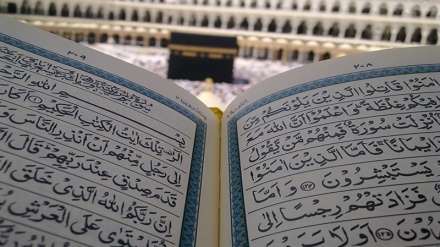Path towards Enlightenment (1009)
Welcome to our weekly episode of “Path towards Enlightenment”, which is an endeavour to make you and us familiar with an easy and fluent explanation of God’s Final Scripture to all mankind, the holy Qur’an that was revealed to the Last and Greatest of all Messengers, Prophet Muhammad (Blessings of God upon him and his progeny).
A fortnight ago we completed explanation of “Surah Jumu’ah” and this Friday and the next week we embark on explanation of the next Surah, that is, “Surah Munafiqoun”, which is number 63 in the serial order of compilation of the holy Qur’an.
Revealed in Medina it has 11 Ayahs and takes its name from its main topic, “Munafiqoun” or the “Hypocrites”. It declares that God bears witness that the hypocrites who pretend to be Muslim utter the false profession of faith only as a screen to hide their duplicity. The Surah warns the believers of the treachery of the hypocrites and describes their behaviour in some detail. Ayah 7 mentions a specific occasion on which the hypocrites tried to prevent the donating of money to the believers, and God calls on the Muslims to compensate for this by giving more of their own funds to the needy.
It is highly recommended to recite this Surah in the weekly congregational Friday Prayer, and such emphasis may be to make Muslims beware of the plots hatched by hypocrites.
According to a narration from the Prophet, the one who recites Surah Munafiqoun is safe from indulgence in hypocrisy.
We now invite you to listen to the opening Ayah of this Surah
“In the Name of God, the Compassionate, the Merciful – When the hypocrites come to you they say, ‘We bear witness that you are indeed the Prophet of Allah’. Allah knows that you are indeed His Prophet, and Allah bears witness that the hypocrites are indeed liars.”
The Arabic word “nifaaq”, derived from the root “nfq”, connotes the underground tunnels used for camouflage or flight as some animals, like field mice and lizards, do by digging two holes. In like manner, hypocrites have secret ways through which they may flee at the time of urgency. The first indication of hypocrisy is the difference between inward intentions and outward conduct, since the hypocrites claim to be believers but their hearts entertains no belief. Thus, God Almighty warns of the intricate plots of the hypocrites who falsely testify to the Prophet’s mission, while their hearts are against him. The Prophet’s Vicegerent Imam Ali ibn Abi Taleb (AS) is quoted as saying that hypocrisy stems from inward inferiority.
Hypocrites in the early days of Islam had found their way into decision making for society and their conspiracies even targeted the Prophet. The explanation of these Ayahs require a prelude and the fact that hypocrisy started in Medina after the Prophet’s migration to this city and establishment of the first Islamic state. There were almost no hypocrites in Mecca where powerful pagans could utter and do whatever they liked against the Islam, Muslims, and the Prophet, without any fear in their hearts. In other words, there was no need to act hypocritically. The establishment of the Islamic state in Medina, however, weakened the enemies, since it was hard and at times impossible for them to deny faith in Islam. Consequently, the defeated enemies made attempts at destructive stratagems in a new guise and thereby pretended to join the Muslims, but they pursued their secretive measures. It is natural that any revolution, following its manifest triumph encounters hypocrites since the bitter enemies of yesterday appear in the guise of the infiltrators of today.
It is, however, noteworthy that the question of hypocrisy and hypocrites is not particular to the time of the Prophet, since any society, particularly the revolutionary society, confronts it. Therefore, the Qur’anic analytical treatment of the subject, not only as a historical question but also as some current affair, requires precise scrutiny so that such treatment may inspire confrontation with the spirit of hypocrisy and hypocritical lines in the Islamic societies in modern times. The hypocrites’ symptoms, extensively reflected in the Holy Qur’an, needs to be accurately understood so that the believers become better aware of their stratagems.
Another point of significance is that the challenge posed to any society by the hypocrites is worse than any open enmity, since it is not easy at all times to recognize them, since these domestic enemies infiltrate within the innermost of the society, which they use as a shield to hide their intentions and secret contacts with the enemies. On one occasion, the hypocrites built a mosque for furthering their plots and asked the Prophet to inaugurate it, but on Allah’s command, the Prophet ordered its demolishment in order to prevent discord amongst Muslims.
From this Ayah we learn:
- A hypocrite is faithless in heart and indulges in lies and flattery.
- True believers and committed revolutionaries are always alert.
Now listen to Ayahs 2, 3, and 4 of the same Surah:
“They make a shield of their oaths and bar from the way of Allah; evil indeed is what they used to do.”
“That is because they believed and then disbelieved, so their hearts were sealed; hence they do not understand.
“When you see them, their bodies impress you and if they speak, you listen to their speech, yet they are like dry logs set reclining (against a wall). They suppose that every cry is against them. They are the enemy, so beware of them. May Allah assail them; where do they stray?”
These Ayahs point to the outward and inward behaviour of the hypocrites, who intend to use their false oaths as a shield to screen their disbelief in Islam in order to damage the society from within. What is worse and more evil than taking oaths in the Sacred Name of God Almighty, is the disguising of one's real intentions in order to deceive Muslims and prevent them for pursuing Islamic goals.
Ayah 3 refers to their diabolical behaviour of earnestly taking pledge to the Prophet while amongst believers, and then telling their fellow seditionists and chiefs that they are firmly against Islam; hence God says their hearts are sealed and they are left to go astray.
The next Ayah warns believers against deception by the looks, appearances, and words of the hypocrites. Although the Prophet is addressed here, the message is for all Muslims, of all generations, to beware of the stratagems of the hypocrites, who are likened to hollowed dry logs propped up against the wall while their cowardly nature makes them afraid of the words of all and everyone.
In short, they deserve curse of the believers in the transient life of the mortal world and Divine punishment in the Hereafter.
From these Ayahs we learn that:
- Hypocrites are the enemies who live among the believers, and thus more dangerous than foreign enemies.
- Though we do not have access to the inward intentions of others, we should be alert towards deception by outward appearances and sweet talk.
- The Hypocrites always intend to prevent spread of Islamic values in society, and revolutionary goals.
We end this week’s episode of Path towards Enlightenment with recitation of Ayahs 5 and 6 of Surah Munafiqoun:
“And when they are told, ‘come, that Allah’s Prophet may plead for forgiveness for you,’ they twist their heads and you see them turn away while they are disdainful.
“It is the same for them whether you plead for forgiveness for them, or do not plead for forgiveness for them: Allah will never forgive them. Indeed, Allah does not guide the transgressors.”
These Ayahs mention some other traits of the hypocrites, who because of their disbelief at heart, ignore the invitation by the believers to avail of God’s Mercy through the Prophet. Their twist of heads out of derision and arrogance, indicate their lack of faith in forgiveness, and thus they deprive themselves of the opportunity to repent of their misdeeds and absolved of their sins by Divine Mercy.
The next Ayah adds that though some of them may come to the Prophet asking for forgiveness, they are not prepared for such forgiveness, since they are devoid of faith at heart. Thus, it would make no difference to them whether you ask or not ask for forgiveness, since God Almighty will never forgive them because of their evil nature. Here it is worth noting that among the goals of the Prophet’s mission is to save sinners by guiding them to the right path, but those who persist in committing sins and turn away from the Truth, deprive themselves of Divine Mercy.
From these ayahs we learn that:
- The mission of the Prophets and saints is to rescue sinners by guiding them to the path of virtue through encouragement of seeking repentance.
- The Prophet of Islam is the means of intercession with God for the forgiveness of those who repent of their sins and misdeeds.
- Arrogance and superciliousness are among the traits of the hypocrites, as they never consider themselves sinners.
- Arrogance and abandoning truth deprives a person of guidance and Divine mercy.
AS/ME


